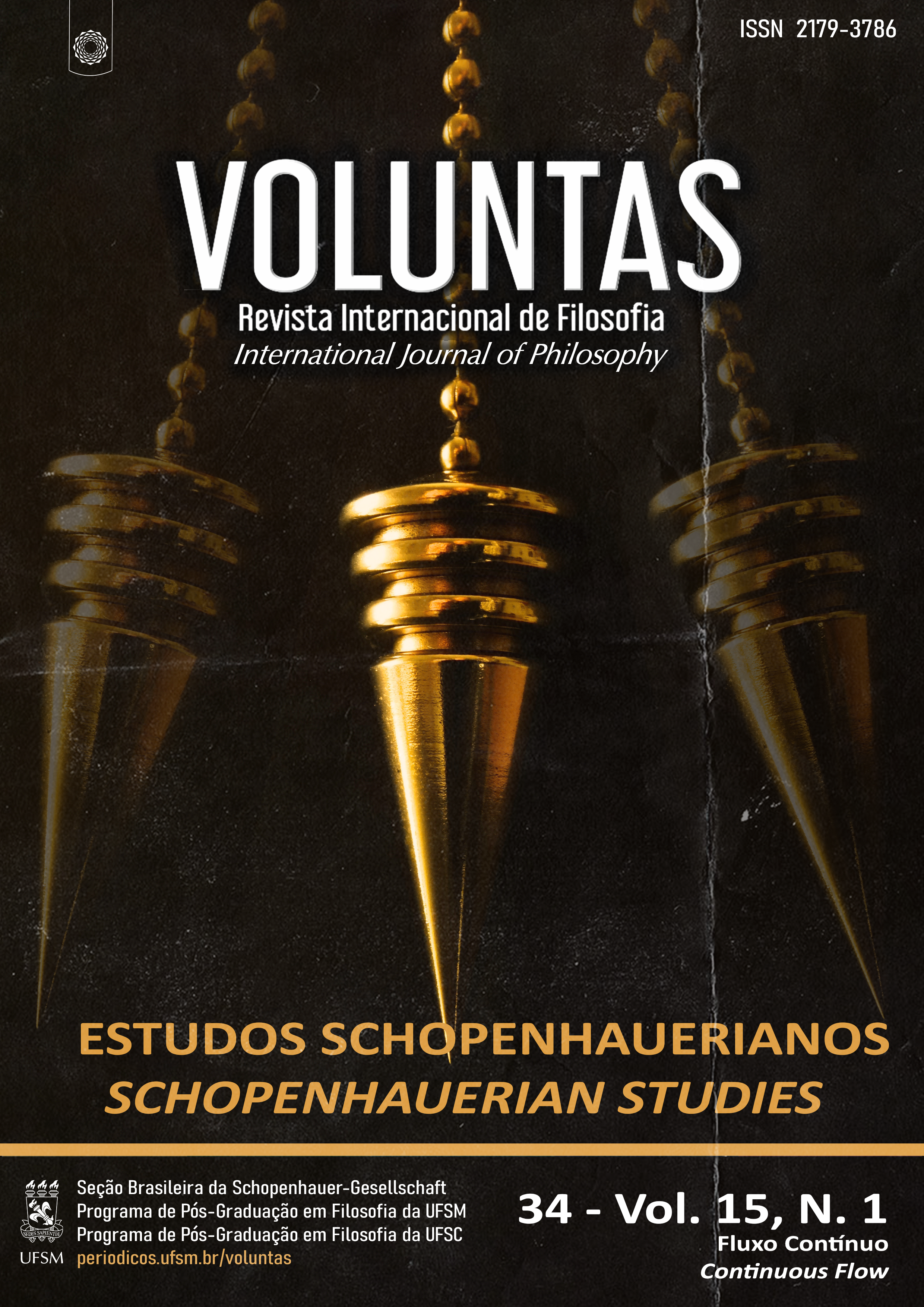Schopenhauer's veiled presence in Nietzsche's On the Future of Our Educational Institutions
DOI:
https://doi.org/10.5902/2179378688294Keywords:
Arthur Schopenhauer, Education, Formation, Friedrich Nietzsche, Honor, Educational institutionsAbstract
The aim of this article is to unveil the subtle presence of Schopenhauer in Nietzsche's lectures On the Future of Our Educational Institutions, delivered by Nietzsche in 1872. To achieve this, it first analyzes the formal similarity between the preface to the first edition of The World as Will and Representation and the one Nietzsche adds to the written version of his lectures. Then, it examines the initial scene of the lectures to identify significant points of contact with Schopenhauer's conception of honor. Subsequently, it explores the role that Nietzsche assigns to professors, which is the central theme of the fourth section. In these two central sections, literal references to Schopenhauer's work that Nietzsche never explicitly stated are exposed. Finally, it explores the educational conception that Nietzsche begins to outline in his fifth lecture: in opposition to an acroamatic education, he suggested an educational relationship that takes the form of guide-guided. Schopenhauer reappears at this point, not only because he also proposes that the professor should play the role of guide, but fundamentally because Nietzsche's demanded model for philosophical education and for himself is embodied in his figure.
Downloads
References
CAMPIONI, G. et al. Nietzsches persönliche Bibliothek. Berlin: Walter de Gruyter, 2003.
DÍAZ GENIS, A.; MÉLICH SANGRÁ, J. C. Nietzsche como educador. Estudios Nietzsche, Málaga, v. 21, pp. 13–29, 2021. DOI:https://doi.org/10.24310/EstudiosNIETen.vi21.13730 Consultado el 12 de mayo de 2024.
FICHTE, J. G. Ueber die einzig moegliche Störung der akademischen Freiheit. Berlin: Humboldt-Universität, 1812. DOI:http://dx.doi.org/10.18452/263 Consultado 12 de julio de 2024.
FRANÇOIS, A. et al. Autour des conférences de Nietzsche «Sur l'avenir de nos établissements d’enseignement». Meta: Research in Hermeneutics, Phenomenology, and Practical Philosophy, Romania, v. 7, n. 2, pp. 252-272, 2015.
JANZ, C. P. Friedrich Nietzsche. Madrid: Alianza Editorial, 1981.
KOßLER, M. Filosofía a las órdenes de la naturaleza y filosofía a las órdenes del gobierno: la crítica de Schopenhauer a la filosofía universitaria. En: ONCINA, Faustino (Ed.). Filosofía para la universidad, filosofía contra la universidad (De Kant a Nietzsche). Madrid: Editorial Dykinson, 2008. pp. 297-309.
LlINARES, J. Buscando espacios para la verdad: Nietzsche y la filosofía en la universidad. En: ONCINA, Faustino (Ed.). Filosofía para la universidad, filosofía contra la universidad (De Kant a Nietzsche). Madrid: Editorial Dykinson, 2008. pp. 311-360.
LlINARES, J. Schopenhauer como educador. Nietzsche lector de Schopenhauer. En: ONCINA, Faustino (Ed.). Schopenhauer en la historia de las ideas. Madrid: Plaza y Valdéz, 2011. pp. 165-192.
MATEU ALONSO, J. D. Nietzsche como educador: el concepto de formación en el joven Nietzsche. ENDOXA, Madrid, v. 1, n. 22, pp. 209–223, 2007. DOI: https://doi.org/10.5944/endoxa.22.2007.5185. Consultado el 24 de mayo de 2024.
NIETZSCHE, F. Obras Completas: Escritos de juventud. Madrid: Tecnos, 2011.
NIETZSCHE, F. Sämtliche Briefe: Kritische Studienausgabe in 8 Bänden. Berlin: Walter de Gruyter, 1986.
NIETZSCHE, F. Sämtliche Werke: Kritische Studienausgabe in 15 Bänden. Berlin: Walter de Gruyter, 1988.
NIETZSCHE, F. Werke: Kritische Gesamtausgabe. Berlin: Walter de Gruyter, 1999.
ONCINA, F. et al. Filosofía para la universidad, filosofía contra la universidad (De Kant a Nietzsche). Madrid: Editorial Dykinson, 2008.
PARDINA HERRERO, A. Filología, filosofía y Bildung: Una aproximación a la crítica nietzscheana de la cultura desde la óptica de la filología clásica. Estudios Nietzsche, Málaga, v. 21, pp. 47-65, 2021. DOI: https://doi.org/10.24310/EstudiosNIETen.vi21.12994. Consultado el 14 de mayo de 2024.
ROSENOW, E. Nietzsche’s Concept of Education. En: YOVEL Yirmiyahu (Ed.). Nietzsche as Affirmative Thinker. Dordrecht: Springer Netherlands, 1986. pp. 119-131. DOI: https://doi.org/10.1007/978-94-009-4360-5_8. Consultado el 21 de diciembre de 2023.
SCHLEIERMACHER, F. D. E. Gelegentliche Gedanken über Universitäten in deutschem Sinn. Berlin: Humboldt-Universität, 2010. DOI: http://dx.doi.org/10.18452/4652. Consultado el 12 de julio de 2024.
SCHOPENHAUER, A. Der handschriftliche Nachlaß. Fráncfort del Meno: Kramer, 1970.
SCHOPENHAUER, A. El mundo como voluntad y representación. Madrid: Trotta, 2013.
SCHOPENHAUER, A. Parerga und Paralipomena: kleine philosophische Schriften. Berlin: Adolph Wilhelm Hayn Verlag, 1851.
SCHOPENHAUER, A. Parerga und Paralipomena: kleine philosophische Schriften. Berlin: Adolph Wilhelm Hayn Verlag, 1862.
SCHOPENHAUER, A. Parerga y Paralipomena. Madrid: Trotta, 2013.
SCHOPENHAUER, A. Sämtliche Werke. Leipzig: F. A. Brockhaus, 1873.
SCHOPENHAUER, A. Sämtliche Werke. Mannheim: Brockhaus, 1988.
Published
How to Cite
Issue
Section
License
Copyright (c) 2024 Luis Adrián Castro

This work is licensed under a Creative Commons Attribution-NonCommercial-ShareAlike 4.0 International License.
The submission of original manuscripts to this journal implies the transference, by the authors, of the copyrights for printed and digital publication. The copyrights of a published manuscript belong ultimately to the author, and only the copyright for its first publication is reserved to the journal. Authors may only use the same results in other publications explicitly indicating this journal as the medium of the original publication.
Licence
Attribution-NonCommercial-ShareAlike 4.0 International (CC BY-NC-SA 4.0) - This license lets others remix, tweak, and build upon your work non-commercially, as long as they credit you and license their new creations under the identical terms.






